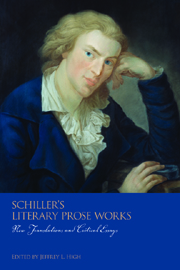Book contents
- Frontmatter
- Contents
- Foreword
- Preface
- Acknowledgments
- Notes on the Translations
- Introduction: Schiller and the German Novella
- The Translations
- The Critical Essays
- 9 (A fragment of) A True Story (from most recent history): The Truth in Schiller's Literary Prose Works
- 10 Playing with the Rules: Schiller's Experiments in Short Prose Fiction, 1782–1789
- 11 Diderot and Schiller's “Revenge”: From Parisian Parody to German Moral Education
- 12 True Crime and Criminal Truth: Schiller's “The Criminal of Lost Honor”
- 13 Der Geisterseher: A Princely Experiment or, the Creation of a “Spiritualist”
- Chronological List of Schiller's Literary Prose Works in English Translation
- Works Cited
- Notes on the Contributors
- Index
12 - True Crime and Criminal Truth: Schiller's “The Criminal of Lost Honor”
from The Critical Essays
Published online by Cambridge University Press: 05 February 2013
- Frontmatter
- Contents
- Foreword
- Preface
- Acknowledgments
- Notes on the Translations
- Introduction: Schiller and the German Novella
- The Translations
- The Critical Essays
- 9 (A fragment of) A True Story (from most recent history): The Truth in Schiller's Literary Prose Works
- 10 Playing with the Rules: Schiller's Experiments in Short Prose Fiction, 1782–1789
- 11 Diderot and Schiller's “Revenge”: From Parisian Parody to German Moral Education
- 12 True Crime and Criminal Truth: Schiller's “The Criminal of Lost Honor”
- 13 Der Geisterseher: A Princely Experiment or, the Creation of a “Spiritualist”
- Chronological List of Schiller's Literary Prose Works in English Translation
- Works Cited
- Notes on the Contributors
- Index
Summary
AS A YOUNG MAN, FRIEDRICH SCHILLER was vitally interested in crime and criminals, not merely for the excitement of the illicit but also for the moral complications that lawbreakers and their judges presented to the thoughtful reader or spectator. His highly successful play, Die Räuber (1781, The Robbers), was built around the figure of Karl Moor, a charismatic criminal who was driven to become a robber captain by a scheming brother and a weak father. Karl did in fact rob, murder, and burn communities to the ground, but he became and remains one of the German stage's most popular heroes. As Schiller put it: “They will admire my incendiary bandit, yes even almost love him.” German audiences loved him without any qualification and the apotheosis of the lawbreaker at the beginning of Schiller's career set the tone for further investigations of criminality as a legitimate response to intolerable circumstances.
Schiller himself lived in intolerable circumstances as a cadet in the personal military school of Duke Karl Eugen of Württemberg, into which he was literally drafted by the Duke at the age of fourteen. Schiller had done especially well in the state examinations and Karl Eugen, reviewing the results, decreed that he should be enrolled against his parents' wishes and against his own. Schiller had hoped to study theology, which was not offered at the Karlsschule (literally “Karl's school”), but he was inducted anyway and ordered to study law and then allowed to study medicine.
- Type
- Chapter
- Information
- Schiller's Literary Prose WorksNew Translations and Critical Essays, pp. 222 - 233Publisher: Boydell & BrewerPrint publication year: 2008

